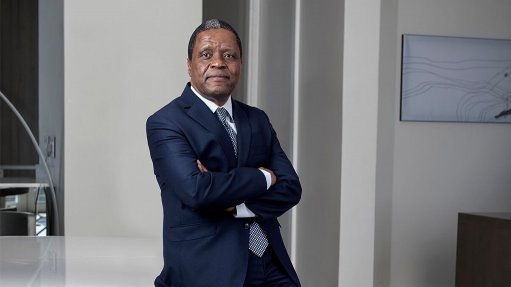
Thebe executive chairperson Vusi Khanyile
One of South Africa’s pioneering black-owned companies, Thebe Investment Corporation, says it is critical that the prevailing uncertainty surrounding the future of independent power producers (IPPs) be urgently resolved, saying that the current “confusion is not appreciated” by it and other investors in the sector.
Executive chairperson Vusi Khanyile, who was central to the founding of the business in 1992, argues that the policy supporting the introduction of private generation is clear, has been quite successful over the years and should therefore be strictly adhered to by State-owned electricity producer Eskom, which he describes as a policy implementer on behalf of the State.
Eskom, which is the designated single buyer of IPP production, has made known its reluctance to enter into new power purchase agreements (PPAs), citing both price and overcapacity as key concerns. There have also been protracted delays in the announcements of preferred bidders for projects already adjudicated during the most recent competitive auctions for renewables, as well as for the first coal-baseload IPP allocation.
Thebe has a significant exposure to the IPP sector, having invested in six renewable-energy projects with a combined capacity of around 600 MW and involving an investment of more than R15-billion. These projects include: the Jeffreys Bay, Noupoort, Loriesfontein and Khobab wind farms, as well as the De Aar and Droogfontein solar photovoltaic plants.
Four of these facilities – Jeffreys Bay, Noupoort, De Aar and Droogfontein – are already operational, while the remaining two will enter commercial operation towards the end of 2017. The company has a policy of investing equity stakes of around 10% for wind and 28% in solar projects.
Thebe is also partnering with ACWA Power, of Saudi Arabia, on the 300 MW Khanyisa coal-fired power project in Mpumalanga province, which was one of two projects that met the November 2, 2015 submission deadline for the first bid window of the Coal Baseload IPP Procurement Programme.
Thebe Energy & Resources CEO Sizwe Mncwango also reports that it is partnering with an as-yet-unnamed power producer to prepare a bid for the proposed gas-to-power (GTP) IPP programme. Thebe has long-standing relations with Royal Dutch Shell, having invested in Shell’s South Africa-based retail and refining operations in 2002 and 2008 respectively.
Prior to the recent uncertainty thrown up by Eskom’s approach to Energy Minister Tina Joemat-Pettersson for consultations ahead of the signing of any further PPAs, the tender for the GTP and gas-import infrastructure had been expected before the end of government’s 2016/17 fiscal year. However, a combination of reticence from Eskom and news that a nuclear request for proposals will be released this month has thrown the programme into doubt.
Nevertheless, the Department of Energy (DoE) has indicated previously that it aims to procure 3 126 MW of gas-fired power generation from IPPs and a further 600 MW from a public-private partnership involving State-owned companies.
Mncwango acknowledges that GTP is more complex than has been the case with the renewables projects, owing to the risk associated with using dollar-denominated imported liquefied natural gas as a feedstock, while selling the electricity produced in rands. However, he reports that various models are being canvassed with the DoE to help facilitate the investments.
He stresses that, while Thebe will maintain a “healthy distance” from those deciding the energy policy framework, it is, nevertheless concerned that the current “conundrum” could provide fertile ground for policy “opportunism”.
Khanyile says leadership is required. But he also stresses that Thebe –formed as a black-business “experiment”, with a R100 000 philanthropic donation to a trust as seed capital during the dying days of apartheid – has survived other uncertain times in the past and has every intention of navigating its way through the current political and market turbulence.
Thebe will mark its twenty-fifth year of existence in July next year.